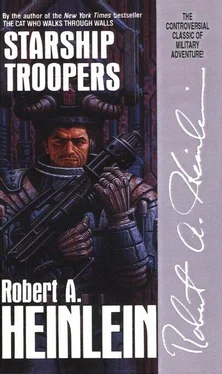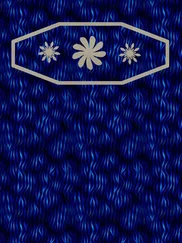Come on, you apes! You wanta live forever?
—Unknown platoon sergeant, 1918
I always get the shakes before a drop. I’ve had the injections, of course, and hypnotic preparation, and it stands to reason that I can’t really be afraid. The ship’s psychiatrist has checked my brain waves and asked me silly questions while I was asleep and he tells me that it isn’t fear, it isn’t anything important — it’s just like the trembling of an eager race horse in the starting gate.
I couldn’t say about that; I’ve never been a race horse. But the fact is: I’m scared silly, every time.
At D-minus-thirty, after we had mustered in the drop room of the Rodger Young , our platoon leader inspected us. He wasn’t our regular platoon leader, because Lieutenant Rasczak had bought it on our last drop; he was really the platoon sergeant, Career Ship’s Sergeant Jelal. Jelly was a Finno-Turk from Iskander around Proxima — a swarthy little man who looked like a clerk, but I’ve seen him tackle two berserk privates so big he had to reach up to grab them, crack their heads together like coconuts, step back out of the way while they fell.
Off duty he wasn’t bad — for a sergeant. You could even call him “Jelly” to his face. Not recruits, of course, but anybody who had made at least one combat drop.
But right now he was on duty. We had all each inspected our combat equipment (look, it’s your own neck — see?), the acting platoon sergeant had gone over us carefully after he mustered us, and now Jelly went over us again, his face mean, his eyes missing nothing. He stopped by the man in front of me, pressed the button on his belt that gave readings on his physicals. “Fall out!”
“But, Sarge, it’s just a cold. The Surgeon said—”
Jelly interrupted. “‘But Sarge!’” he snapped. “The Surgeon ain’t making no drop — and neither are you, with a degree and a half of fever. You think I got time to chat with you, just before a drop? Fall out! ”
Jenkins left us, looking sad and mad — and I felt bad, too. Because of the Lieutenant buying it, last drop, and people moving up, I was assistant section leader, second section, this drop, and now I was going to have a hole in my section and no way to fill it. That’s not good; it means a man can run into something sticky, call for help and have nobody to help him.
Jelly didn’t downcheck anybody else. Presently he stepped out in front of us, looked us over and shook his head sadly. “What a gang of apes!” he growled. “Maybe if you’d all buy it this drop, they could start over and build the kind of outfit the Lieutenant expected you to be. But probably not — with the sort of recruits we get these days.” He suddenly straightened up, shouted, “I just want to remind you apes that each and every one of you has cost the gov’ment, counting weapons, armor, ammo, instrumentation, and training, everything, including the way you overeat — has cost, on the hoof, better’n half a million. Add in the thirty cents you are actually worth and that runs to quite a sum.” He glared at us. “So bring it back! We can spare you, but we can’t spare that fancy suit you’re wearing. I don’t want any heroes in this outfit; the Lieutenant wouldn’t like it. You got a job to do, you go down, you do it, you keep your ears open for recall, you show up for retrieval on the bounce and by the numbers. Get me?”
He glared again. “You’re supposed to know the plan. But some of you ain’t got any minds to hypnotize so I’ll sketch it out. You’ll be dropped in two skirmish lines, calculated two-thousand-yard intervals. Get your bearing on me as soon as you hit, get your bearing and distance on your squad mates, both sides, while you take cover. You’ve wasted ten seconds already, so you smash-and-destroy whatever’s at hand until the flankers hit dirt.” (He was talking about me — as assistant section leader I was going to be left flanker, with nobody at my elbow. I began to tremble.)
“Once they hit — straighten out those lines!—equalize those intervals! Drop what you’re doing and do it! Twelve seconds. Then advance by leapfrog, odd and even, assistant section leaders minding the count and guiding the envelopment.” He looked at me. “If you’ve done this properly — which I doubt — the flanks will make contact as recall sounds … at which time, home you go. Any questions?”
There weren’t any; there never were. He went on, “One more word — This is just a raid, not a battle. It’s a demonstration of firepower and frightfulness. Our mission is to let the enemy know that we could have destroyed their city — but didn’t — but that they aren’t safe even though we refrain from total bombing. You’ll take no prisoners. You’ll kill only when you can’t help it. But the entire area we hit is to be smashed. I don’t want to see any of you loafers back aboard here with unexpended bombs. Get me?” He glanced at the time. “Rasczak’s Roughnecks have got a reputation to uphold. The Lieutenant told me before he bought it to tell you that he will always have his eye on you every minute … and that he expects your names to shine !”
Jelly glanced over at Sergeant Migliaccio, first section leader. “Five minutes for the Padre,” he stated. Some of the boys dropped out of ranks, went over and knelt in front of Migliaccio, and not necessarily those of his creed, either — Moslems, Christians, Gnostics, Jews, whoever wanted a word with him before a drop, he was there. I’ve heard tell that there used to be military outfits whose chaplains did not fight alongside the others, but I’ve never been able to see how that could work. I mean, how can a chaplain bless anything he’s not willing to do himself? In any case, in the Mobile Infantry, everybody drops and everybody fights — chaplain and cook and the Old Man’s writer. Once we went down the tube there wouldn’t be a Roughneck left aboard — except Jenkins, of course, and that not his fault.
I didn’t go over. I was always afraid somebody would see me shake if I did, and, anyhow, the Padre could bless me just as handily from where he was. But he came over to me as the last stragglers stood up and pressed his helmet against mine to speak privately. “Johnnie,” he said quietly, “this is your first drop as a non-com.”
“Yeah.” I wasn’t really a non-com, any more than Jelly was really an officer.
“Just this, Johnnie. Don’t buy a farm. You know your job; do it. Just do it. Don’t try to win a medal.”
“Uh, thanks, Padre. I shan’t.”
He added something gently in a language I don’t know, patted me on the shoulder, and hurried back to his section. Jelly called out, “Tenn … shut !” and we all snapped to.
“Pla toon !”
“Sec tion !” Migliaccio and Johnson echoed.
“By sections — port and starboard — prepare for drop!”
“Sec tion ! Man your capsules! Move! ”
“Squad!”—I had to wait while squads four and five manned their capsules and moved on down the firing tube before my capsule showed up on the port track and I could climb into it. I wondered if those old-timers got the shakes as they climbed into the Trojan Horse? Or was it just me? Jelly checked each man as he was sealed in and he sealed me in himself. As he did so, he leaned toward me and said, “Don’t goof off, Johnnie. This is just like a drill.”
The top closed on me and I was alone. “Just like a drill,” he says! I began to shake uncontrollably.
Then, in my earphones, I heard Jelly from the center-line tube: “Bridge! Rasczak’s Roughnecks … ready for drop!”
“Seventeen seconds, Lieutenant!” I heard the ship captain’s cheerful contralto replying — and resented her calling Jelly “Lieutenant.” To be sure, our lieutenant was dead and maybe Jelly would get his commission … but we were still “Rasczak’s Roughnecks.”
Читать дальше












